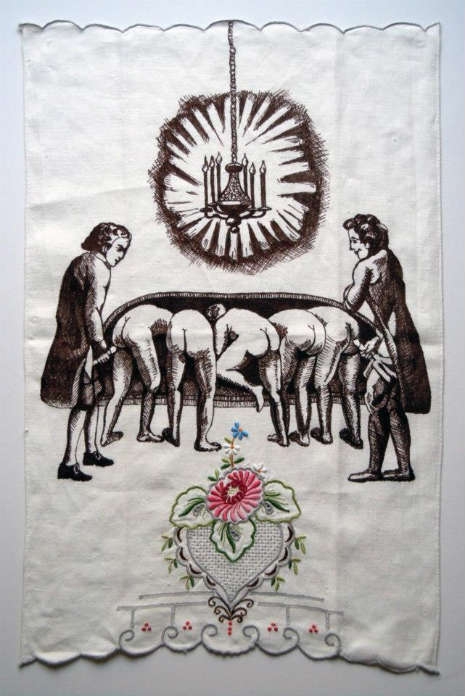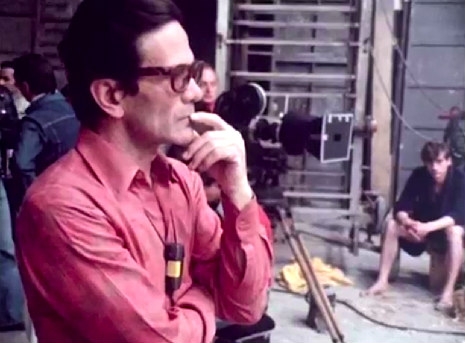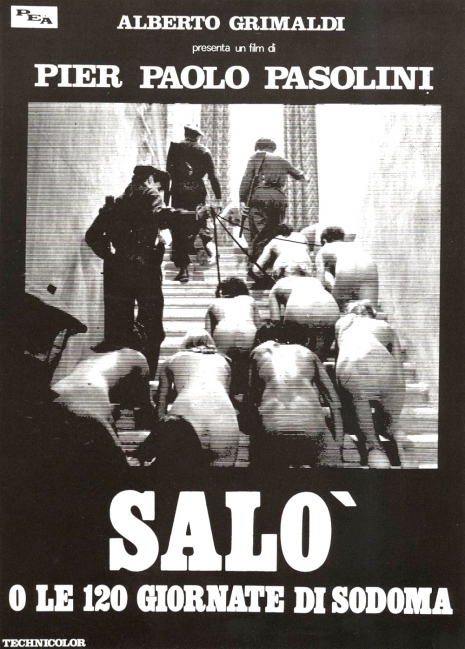
The esteemed film critic Roger Ebert was reputed to have owned a copy of Pier Paolo Pasolini’s movie Salò, or The 120 Days of Sodom on laserdisc, but knowing of its graphic and “obscene” content never had the courage to watch it.
Salò is one of those movies like Deep Throat or 101 Dalmatians where an audience will usually know much about it without ever having actually seen it. Indeed, Pasolini expected his audience to have swotted up on a whole semester’s worth of books before they viewed Salò so they would fully appreciate his clever subtext and his artful allusions to politics and culture and art, et cetera. Hence, the acknowledgment to the film’s “essential bibliography” of texts by Barthes, Blanchot, De Beauvoir, Klossowski, and Sollers during the opening titles.
The one book not mentioned is the film’s original source, the Marquis de Sade’s doorstop of a novel 120 Days of Sodom or the School of Libertinage.
De Sade wrote 120 Days of Sodom when he was banged up in the Bastille prison in Paris for his villainous libertine ways in 1785. Outside, the city was in a flux of brutal revolutionary fervor which provided de Sade with some ideas for his nasty erotic tale—carnage and slaughter, on one hand, excess and terror on the other. He wrote the story on a long roll of paper which he secreted in his cell. When the Bastille was raided by the revolutionary mob and the prisoners released, de Sade wept tears of grief over the thought he had lost his manuscript to looters. Fortunately for him, it was still hidden in the wall his cell.
120 Days of Sodom is the story of four weirdo libertines who decide they want to experience the most depraved forms of sexual gratification through torture, rape, and murder. They lock themselves up, along with their victims and accomplices, in a castle the Château de Silling in France, where they carry out their monstrous acts without censure. The book was never fully finished and was not published until the twentieth century when it became a favorite with the Surrealists.
Pasolini used parts of de Sade’s book, added in a flavoring from Dante’s Inferno from The Divine Comedy, and relocated the whole story to the “puppet Nazi state” of Salò in northern Italy during Mussolini’s final years of power at the end of the Second World War. This time the debauched quartet are a Duke, a Bishop, a Magistrate and a President, who carry out acts of incest, rape, torture, mutilation, castration, and murder on eighteen kidnapped young men and women. Pasolini’s intention was to make a film that attacked the horror of capitalist society, as he explained in a television interview during filming:
There is a lot of sex in it, rather towards sadomasochistic, which has a very specific function—that is to reduce the human body to a saleable commodity. It represents what power does to the human being, to the human body.
All my films start from a formal idea, which I feel I must do. It is an idea I have of the kind of film it must be. It cannot be expressed in words, you either understand it or you don’t. When I make a film, it because I suddenly have an inspiration about the form of that particular subject must take. That is the essence of the film.
As I shoot this film, I already have it edited in my mind. Therefore, I expect a greater professional ability from my actors. So, this film I’m using four or five professional actors. But even the ones I have collected from the streets, I use them almost as if they were professional actors. The lines have to be said properly, the way they were written, and all in one take. They must have the correct facial expression from the beginning to the end of the shot, etc etc.
My need to make this film also came from the fact I particularly hate the leaders of the day. Each one of us hates with particular vehemence the powers to which he is forced to submit. So, I hate the powers of today. It is a power that manipulates people just as it did at the time of Himmler or Hitler.
I don’t think the young people of today will understand this film. I have no illusions about my ability to influence young people. It is impossible to create a cultural relationship with them because they are living with totally new values, with which the old values cannot be compared.
I don’t believe we shall ever again have any form of society in which men will be free. One should not hope for it. One should not hope for anything. Hope is invented by politicians to keep the electorate happy.
At the time of its release in 1975, Salò was denounced as “pornographic,” “obscene,” “filth,” “vile,” “sick,” and “depraved.” It was banned in several countries due its graphic sex and violence. None of this content would surprise many today in a world where rape porn and videos of Daesh beheadings are just a keystroke away but at the time, it was like a hand grenade going off in a busy kindergarten.
This said I have to ‘fess up to having one big problem with Salò. I found the whole film boring. Its relentless sequence of atrocities never quite added up to anything constructive or intellectually meaningful. The film could not be entertaining because of its content and it did not develop beyond making the same point over and over and over again. It was like being bludgeoned about the head with a copy of Marxism for Dummies by a surly teenager who has just discovered the brutal injustice of life. You know you’re being attacked but you don’t know why you’re being attacked because you’re not the one responsible for what your attacker is angry about. This is probably why Pasolini included a bibliography at the start, he wanted his audience to stroke their chins and knowingly nod along as another atrocity was depicted.
I believe movies like books and drama work best when they offer the good ole double-edge of entertainment and some kind of intellectual engagement that kicks in long after reading or viewing. For an entertaining assault on capitalism and class, better read something like J. G. Ballard’s High Rise, or Bentley Little’s The Store, or my DM colleague Christopher Bickel’s movie The Theta Girl all which make similar points to Salò but in a far more entertaining, enjoyable, and memorable way.
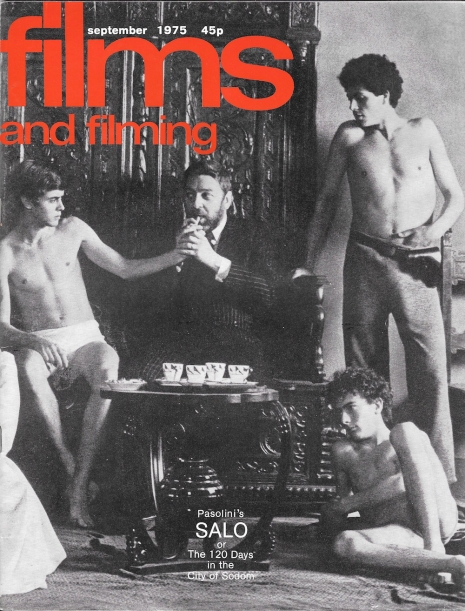
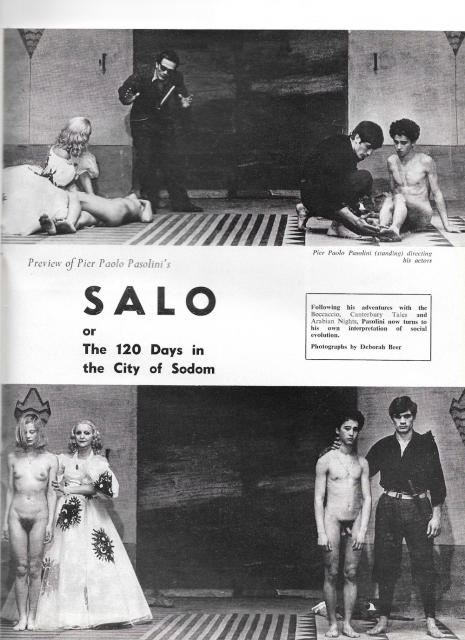
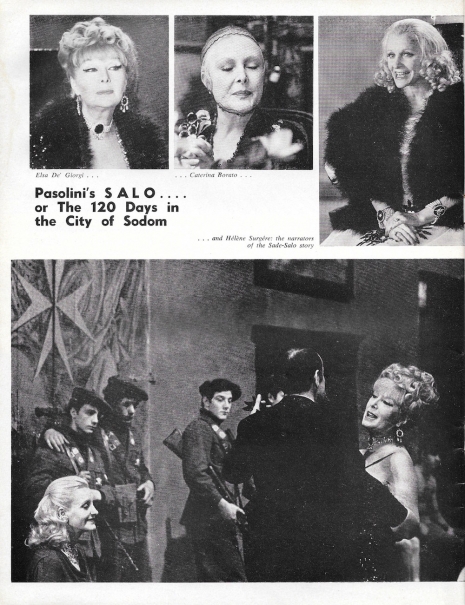
More lobby cards from ‘Salò,” after the jump…








